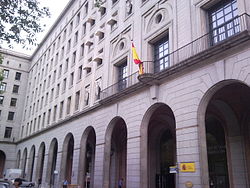Ministry of Inclusion, Social Security and Migration
This article may be expanded with text translated from the corresponding article in Spanish. (January 2020) Click [show] for important translation instructions.
|
| Ministerio de Inclusión, Seguridad Social y Migraciones | |
 | |
 Main door of the Ministry in the Nuevos Ministerios complex | |
| Agency overview | |
|---|---|
| Formed | 13 January 2020 |
| Preceding agency |
|
| Type | Ministry |
| Jurisdiction | Government of Spain |
| Annual budget | € 42.9 billion, 2021 (Ministry)[1] € 176.2 billion, 2021 (Social Security Administration)[2] |
| Minister responsible |
|
| Website | www.inclusion.gob.es |
The Ministry of Inclusion, Social Security and Migration is a department of the government of Spain responsible for planning and carrying out the government policy on Social Security, foreigners, immigration and emigration.
The Ministry's purpose is to guarantee a sufficient and sustainable pension system, to establish new inclusive policies that reduce inequality, uncertainty and social exclusion and to develop a new legal framework to order and give security for migrants.[3] The major policy planned by the ministry is to establish and manage a 'vital minimum income'.[4]
The department was created by Prime Minister Pedro Sánchez as part of the Sánchez II Government and it took on some of the responsibilities of the Ministry of Labour, Migrations and Social Security; as well as the responsibilities of the Ministry of Finance in civil servants' pensions. It is overseen by the Minister of Inclusion, Social Security and Migration, currently José Luis Escrivá, who was appointed on 13 January 2020.[5][6][7]
Structure[]
This Ministry is structured in the following higher bodies:[8]
- The Secretariat of State for Social Security and Pensions
- The Directorate-General for Social Security Management
- The Office of the Comptroller General of the Social Security
- The Secretariat of State for Migration
- The Directorate-General for Migration
- The Directorate-General for Inclusion and Humanitarian Attention
- The Deputy Directorate-General for Economic Planning and Management
- The General Secretariat for Objectives and Policies of Social Inclusion and Forecast
- The Deputy Directorate-General for Inclusion Objectives and Indicators
- The Deputy Directorate-General for Inclusion Policies
- The Undersecretariat
- The Technical General Secretariat
Agencies[]
- The National Institute for Social Security
- The Social Institute for Sea Workers
- The Social Security General Treasury
- The Social Security IT Department
- The Legal Service of the Social Security Administration
- The Permanent Observatory of Immigration
List of officeholders[]
Office name:
- Ministry of Inclusion, Social Security and Migration (2020–present)
| Portrait | Name (Birth–Death) |
Term of office | Party | Government | Prime Minister (Tenure) |
Ref. | ||||
|---|---|---|---|---|---|---|---|---|---|---|
| Took office | Left office | Duration | ||||||||

|
José Luis Escrivá (born 1960) |
13 January 2020 |
Incumbent | 2 years and 68 days | Independent | Sánchez II | Pedro Sánchez (2018–present) |
[9] | ||
References[]
- ^ "2021 State Budget" (PDF). www.boe.es. 4 January 2021. Retrieved 6 January 2021.
{{cite web}}: CS1 maint: url-status (link) - ^ "2021 Social Security Budget" (PDF). www.boe.es. 4 January 2021. Retrieved 6 January 2021.
{{cite web}}: CS1 maint: url-status (link) - ^ Congress of Deputies (27 February 2020). "Minutes of the Congressional Committee on Labour, Inclusion, Social Security and Migration" (PDF). Minutes of the Cortes Generales: 3–5.
- ^ Martinez, Marta Rodriguez (2020-04-17). "Will universal basic income become a reality after lockdown is lifted?". euronews. Retrieved 2020-05-02.
- ^ "El Gobierno contará con un nuevo ministerio de Seguridad Social, Inclusión y Migraciones". La Vanguardia (in Spanish). 10 January 2020. Retrieved 12 January 2020.
- ^ "Sánchez creará un Ministerio de Seguridad Social, Inclusión y Migración". Cinco Días (in Spanish). 10 January 2020. Retrieved 12 January 2020.
- ^ "José Luis Escrivá, nuevo ministro de Seguridad Social, Inclusión y Migraciones". El Mundo (in Spanish). 10 January 2020. Retrieved 12 January 2020.
- ^ "Royal Decree 139/2020, of January 28, which establishes the basic organic structure of the ministerial departments". boe.es. Retrieved 2020-01-30.
- ^ "Real Decreto 8/2020, de 12 de enero, por el que se nombran Ministros del Gobierno" (PDF). Boletín Oficial del Estado (in Spanish). Agencia Estatal Boletín Oficial del Estado (11): 2882. 13 January 2020. ISSN 0212-033X.
- Ministries established in 2020
- 2020 establishments in Spain
- Government ministries of Spain
- European government stubs
- Spain politics stubs